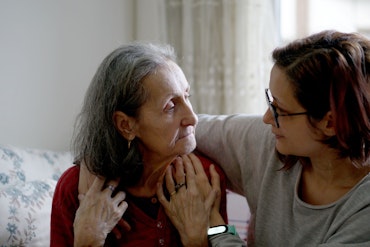More funding for rural palliative care and a better understanding needed
An internationally recognised palliative care specialist has called for more palliative care funding and equitable access to palliative care services in rural and regional areas, and suggested if people understood what good palliative care can do, there would be less focus and less call for euthanasia in Australia.

Professor Rod MacLeod
“Until adequate palliative care services are provided throughout Australia, it makes no sense to talk about the need for euthanasia or Physician Assisted Suicide (PAS),” Professor Rod MacLeod Senior Staff Specialist in Palliative Care with HammondCare and Conjoint Professor in Palliative Care Medicine, The University of Sydney says.
“Palliative care is about supporting the living – its aim is to improve the quality of life for the person who is dying. Good palliative care attends to the psychological, spiritual and physical needs of the person and their family,” he continues. “It is about living well – not waiting to be dead. In palliative care, we try to rekindle hope. People often first come to us feeling hopeless – but everybody can have something to hope for.”
Professor MacLeod, who is returning to New Zealand, says specialist palliative care services in many rural and regional areas of Australia were inadequate and the provision of around the clock services was limited despite many people trying hard to get improvements funded.
“Where you live should not determine the quality of palliative care you receive when you die. But many rural areas throughout Australia rely on GPs and community nurses for after-hours care, many of whom are not appropriately trained in the provision of palliative care,” he says.
Prof MacLeod believes Australia could do better in the provision of palliative care for indigenous people and services needed to adapt to cater to people of different faiths and cultures.
“New Zealand does this better than Australia – and we can learn from them,” he says.
While many Australians would prefer to die at home if they could, Prof MacLeod feels Australia falls behind when compared to countries such as Ireland, France, the USA and New Zealand, who all have higher home death rates than Australia.
He believes there should be more education in palliative care for all relevant health professionals, and palliative care training modules should be included in all relevant university courses. He also says it is essential to promote the uptake of advance care planning across the health system so that people can give this important time of their lives due consideration.
“Writing a will, planning for how and where you want to die – these are all issues that require thought, time and courage,” he highlights.
Developing and implementing a national public awareness campaign, funded by the Federal Government, would he says, encourage people to talk about how they would like to die.
“A national conversation on how we want to die needs to happen to help us make better informed choices about the end of life,” says Prof Macleod. “The Federal Government should fund a public awareness campaign encouraging people to talk about how they would like to die, which would also lead to a better national dialogue around issues of euthanasia and physician-assisted suicide (PAS).”
“Funding for palliative care programs and integration of existing services is crucial – so all Australians have access to the same services. A good example is the NSW PCHSP program which provides assistance for people wanting to die at home – this should be made available in all States and Territories,” he says.
And Prof Macleod’s advice to someone who has a relative or close friend dying: “Try not to be afraid – sit down and give them time.”























